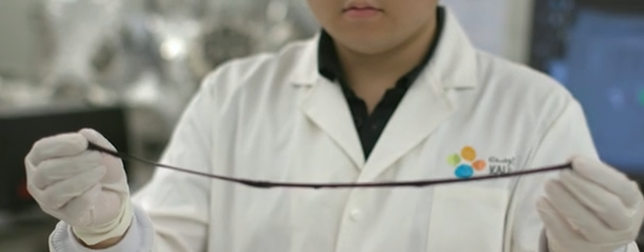An innovative electrically conductive hydrogel that can stretch, flex, and self-heal when cut and reattached, has been developed by researchers at King Abdullah University of Science & Technology (KAUST) in Saudi Arabia. The invention can be helpful in a variety of applications including wearable electronics, wound healing patches, and touch-sensitive robotics.
Smart patches are gaining popularity in the wearable market. These patches can be used in drug delivery, sports, or patient monitoring. Smart patches will also be a big topic at our upcoming WT | Wearable Technologies Conference 2018 USA.
The new material was created by combining a water-infused hydrogel with a metal-carbide compound called MXene. The gel is so flexible that it can stretch by up to 3400 percent before returning to its original size. The versatility of this material enables it to reattach itself after being cut into pieces, and it can easily adhere to skin. However, the crucial feature of this new material is that it can act as a highly sensitive strain sensor.
Read more This ‘OLED Patch’ Will Heal Your Wounds Anywhere and Any Time
“The material’s differing sensitivity to stretching and compression is a breakthrough discovery that adds a new dimension to the sensing capability of hydrogels,” said Yizhou Zhang, one of the researchers involved in the study.
Subtle changes in the human body is picked up by the gel, which then converts them to electrical signals. For example, a thin wedge of the gel attached to a person’s forehead can sense changes in facial expression. The scientists believe the material has the potential to be used in severely paralyzed people to help them communicate and control electronic equipment, such as a wheelchair or prosthetic limb.
The researchers were able to record the speech of participants by attaching the gel to their throat, which transmitted electrical signals. This suggests the material could be useful in speech enhancement technology for those with speech difficulties.
Read more Innovative Tools and Services for Healthcare
The gel can also be used as a flexible wound covering or an internal dressing for organs in the body. As the material is responsive, it could monitor the shape and volume of the tissue it covers, and potentially release drugs in response to tissue specific cues, providing a smart drug delivery device.
About KAUST
King Abdullah University of Science and Technology (KAUST) is a private research university located in Thuwal, Saudi Arabia. Founded in 2009, the University provides research and graduate training programs in English as the official language of instruction. It is the first mixed-gender university campus in Saudi Arabia. KAUST advances science and technology through distinctive and collaborative research integrated with graduate education.










